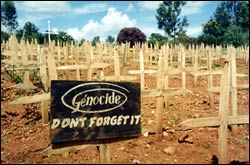"The whole country is full of these things, these crosses."
One of the most famous massacre sites in Rwanda is on the outskirts of Kigali, in a field covered with white crosses. Karasira Venuste has told the story many times. How in the first days of the genocide, several thousand people came to the École Technologic seeking protection from the Belgian peacekeepers billeted there. But the UN ordered the Belgian troops to leave.
"And we cried," Venuste says. "We said, 'Why are you leaving us?' They told us there would be some gendarme coming to protect you. We asked them do not leave. We told some young boys to lie down in front of their jeeps and cars. "
| |

Today mass graves mark the places where almost a million Rwandan Tutsi and moderate Hutu were killed. This genocide memorial is just outside the capitol, Kigali. Photo: D. George / American RadioWorks |
But the Belgians left anyway and less than two hours later, Hutu militia entered the school grounds. They marched the refugees along a dirt road lined with purple morning glories and yellow daisies to an open clearing. Then, Karasira Venuste remembers, the killing began. "It started around 5:30. Around 6:30 they stopped, but very few survivors were remaining."
Venuste lost his arm to a machete blow but saved himself by lying under a pile of corpses. His wife and son also survived. His daughter is buried here among the plain white wooden crosses. The very idea of compensation, he says, is crazy.
"What price could you give me to buy my right arm? When I come here I see all these people who were my friends, my people. My daughter is lying here, maybe."
And the worst thing, he says, would be listening to the stories and seeing the killers. "I fear that people will be more traumatized than they are now. Including myself, including myself. I don't want to hear somebody telling me 'I killed your son or your daughter'. I don't wish to hear those stories. No. Because I would run mad. I would run mad."
From the villages of Rwanda, to Bosnia and to Germany, justice—whether in the grass or in a courtroom—is a long and uncertain journey.
The United States played a key role in trying to bring justice to each of these conflicts.
Indeed, the world's first ever genocide conviction…at the Rwanda tribunal...was secured
by an American prosecutor. Today, the United States continues to support war crimes trials for individual countries but opposes a global war crimes court that could place Americans under its jurisdiction.
At his famous opening speech at Nuremberg, U.S. Supreme Court justice Robert Jackson said that the laws used against Nazi leaders would serve little purpose if they were not applied to all nations.
Today, Jackson's vision is still far from becoming a reality.

